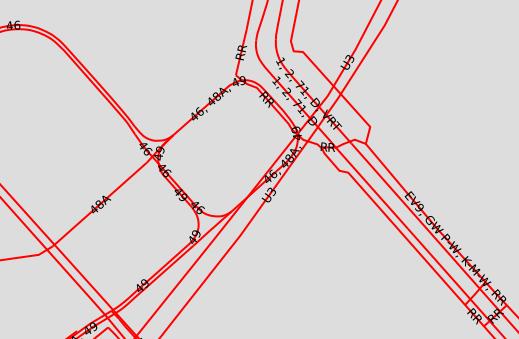MapCSS/0.2/Proposal lists
Jump to navigation
Jump to search
Proposal
Some keys in OpenStreetMap allow (resp. it is common) the use of lists as values, e.g. cuisine=* and ref=*.
Also, lists can be useful for eval statements, e.g. to collect the Names or refs of route relations on the ways.
List selector
The value is treated as a semicolon-separated string, e.g. "regional;asian". If the value does not contain a semicolon, it is treated as list with only one value, e.g. "regional".
node[cuisine~=regional] /* Matches against all nodes where the cuisine tags contains "regional" as list element */
Support:
| Feature | JOSM | pgm |
|---|---|---|
List selector *[cuisine~=regional]
|
+ | + |
List eval functions
Data type list: A list of values, may be empty (equals none).
The following functions may be used with lists:
General functions
| Function | Description | Example | JOSM | pgm |
|---|---|---|---|---|
| list(a, b, ...) => list | create list of values | list("foo", "bar") | + | + |
| get(lst:list, i:int) => value | return the ith element of the list lst (counting starts at 0); returns none if i is out of range. | get(list("foo", "bar"), 1) => "bar" | + | + |
| set(lst:list, i:int, v:value) => list | set the ith element of the list lst to value v | set(list("foo", "bar"), 1, "baz") => list("foo", "baz") | + | + |
| append(lst:list, v:value) => list | append the value v to list lst | append(list("foo", "bar"), "baz") => list("foo", "bar", "baz") | - | + |
| split(sep:string, str:string) => list | splits string str at occurrences of the separator string sep, returns a list | split(";", "foo;bar") => list("foo", "bar") | + | + |
| join(sep:string, lst:list) => string | joins a list with sep as separator | join(";", list("foo", "bar")) => "foo;bar" | - | + |
| count(lst:list) => int | count of elements in the list lst | count(list("foo", "bar")) => 2 | + | + |
| contains(lst:list, v:value) => boolean | returns true if list lst contains value v | contains(list("foo", "bar"), "bar") => true | - | + |
| search(lst:list, v:value) => int | returns first index of value v in list lst or none if not found. | search(list("foo", "bar"), "bar") => 1 | - | + |
| unique(lst:list) => list | removes duplicate values from list lst | unique(list("foo", "bar", "foo")) => list("foo", "bar") | - | + |
| sort(lst:list) => list | order list alphabetically ascending | sort(list("foo", "bar", "12", "1", "2")) => list("1", "12", "2", "bar", "foo") | - | + |
| natsort(lst:list) => list | order list 'natural' sort order | sort(list("foo", "bar", "12", "1", "2")) => list("1", "2", "12", "bar", "foo") | - | + |
| min(lst:list) => number | returns lowest of the input values | min(list(12, 1, 2)) => 1 | - | + |
| max(lst:list) => number | returns highest of the input values | max(list(12, 1, 2)) => 12 | - | + |
| sum(lst:list) => number | returns the sum of all input values | sum(list(12, 1, 2)) => 15 | - | - |
| reverse(lst:list) => list | returns the list in reverse order | reverse(list("foo", "bar", "baz")) => list("baz", "bar", "foo") | - | - |
| range(start:number, end:number[, step:number]) => list | returns a list of numbers, starting with start and ending with end increased by step (default: 1) | range(-5, -10, -2.5) => list(-5, -7.5, -10) | - | - |
Examples
Label all restaurants with asian cuisine
*[amenity=restaurant][cuisine~=asian] {
text: name;
}
Show route refs on ways
Collect all route refs on their respective ways and print them joined after sorting naturally.
relation[type=route][ref] way {
refs: append(prop(refs), parent_tag(ref));
set .has_refs;
}
way.has_refs {
color: #ff0000;
width: 2;
text: join(", ", natsort(prop(refs)));
text-position: line;
}
References
List selector
- JOSM: http://josm.openstreetmap.de/wiki/Help/Styles/MapCSSImplementation#Conditionselector
- pgmapcss: https://github.com/plepe/pgmapcss/blob/master/doc/MapCSS.creole#condition-selector
List eval functions
- JOSM: http://josm.openstreetmap.de/wiki/Help/Styles/MapCSSImplementation#Evalexpressions
- pgmapcss: https://github.com/plepe/pgmapcss/blob/master/doc/eval.creole#list-functions
